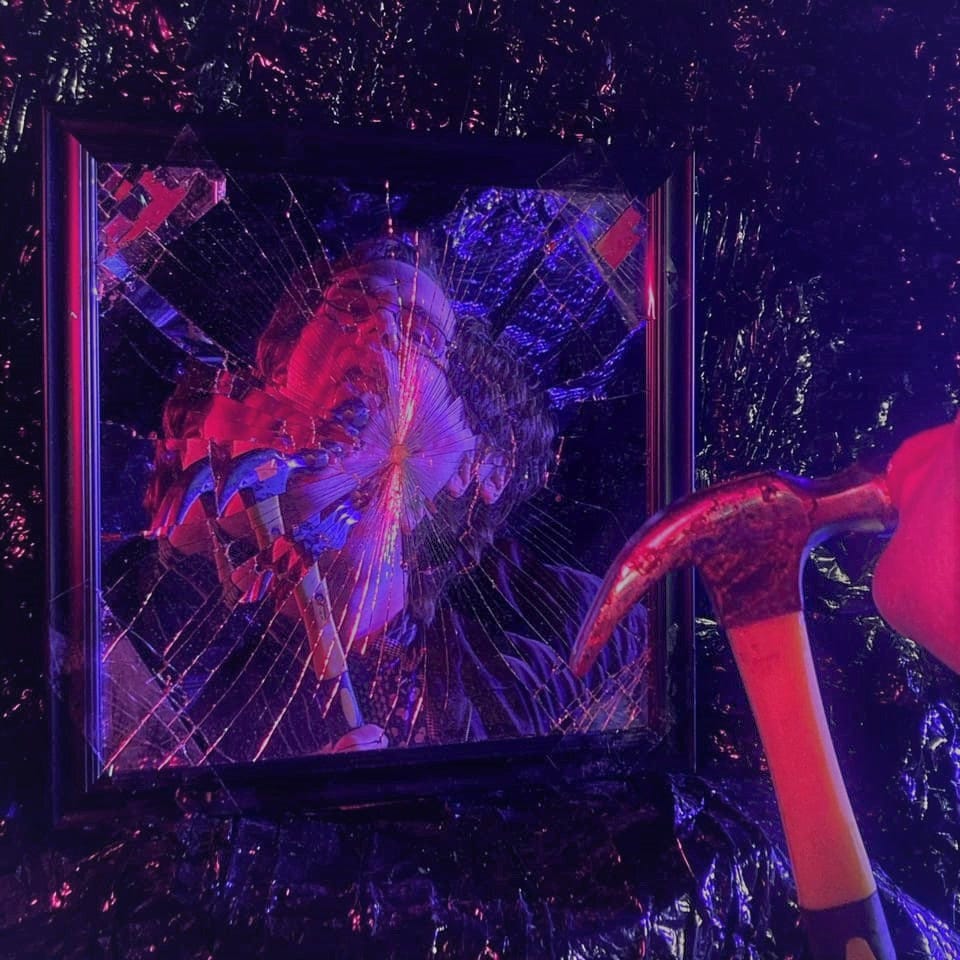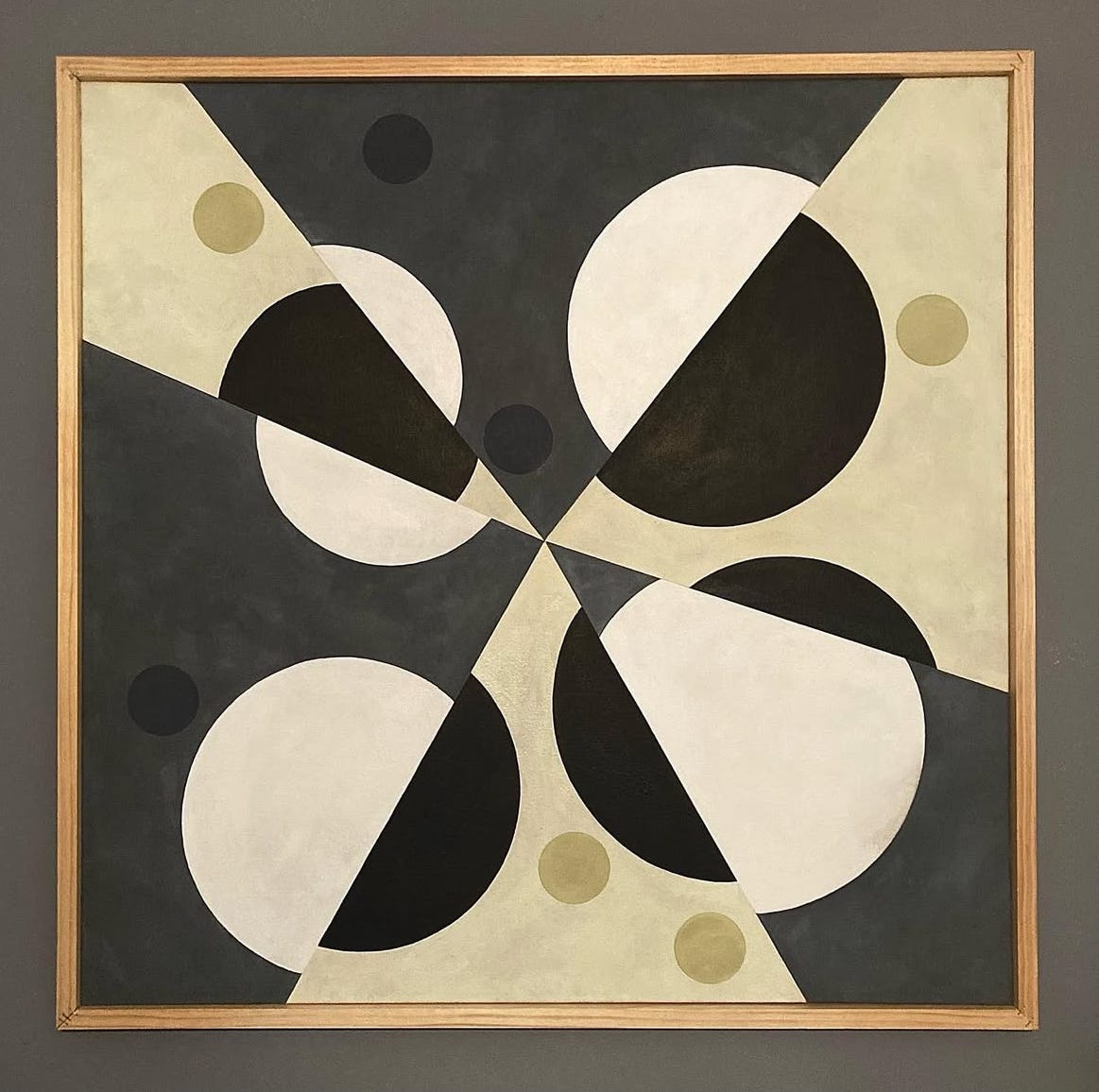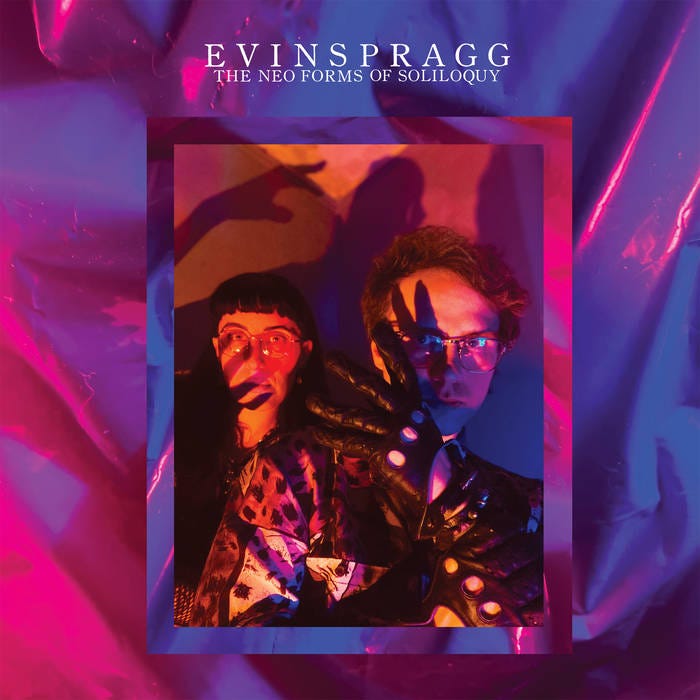To keep with a theme of interviewing ex-bandmates, today we sit with Eric Mayer aka Evinspragg. The Neo Forms of Soliloquy is due out on Inscrutable Records on April 18th. I was honored to be asked to contribute a blurb about it for his Bandcamp and the Inscrutable newsletter. Little did I know that Martin and I would be poking the same bear. I caught zero flack because no one cares what I have to say, whereas Martin stirred up quite a shitstorm. Here’s my part:
Forget Devo-fried Egg Punk. That’s old hat. Passe. A fool’s errand. This is the NEW wave. This is Egghead Punk. Just don’t get it twisted. It ain’t some nose-in-the-air pseudo sophisto junk. We’re talking thinkin’ person’s punk. Maybe Uniform Choice screaming “Use Your Head” wasn’t just for the cropped mop sport-o punks? This one’s for the Freakers, the Art Punkers, and the metal faced Industrial wastoids.
I met Eric something like 23 years ago when our bands played a house show together. I have no recollection of us meeting, which is rare. But Eric remembers so why would I doubt him? We more formally met four years later at the hub of the Hartford scene, Quentin’s Garage. Within six months we started Bored Straight. He’d eventually replace Q on drums for Foreign Lawns. Even further down the road, when he needed someone to make people uncomfortable, he tapped me to front Detenzione. For a span of a dozen years I got to take up space next to one of the most talented people I’ve ever known, something I’ve never taken for granted.
This interview was conducted in the Summer of 2024 as a preview for an upcoming Evinspragg show. Ironically, while away on a vacation/writer’s sabbatical (more on that someday), I realized the deadline for the article was that day and that I wouldn’t make it. I sent an email to the editor, received no response, and no response to any subsequent article pitches. Good riddance. Better to write on my own timeline than intertwine myself with a joke. So here we are, finally seeing this thing in the light of day.
I know how much art ties into Evinspragg. I guess any music, any bands you play in, really. But do you consider Evinspragg an extension of art, like an art project of sorts?
Yeah, I do. I think it's kind of like, well, maybe at the time when I started, I didn't really think of it that way, but I didn't even think Evinspragg was going to last very long. I kind of wanted to write a few songs and then I realized that I was developing my own formula for it. I got way into it and of course I was painting abstract paintings at the time. I feel like the style of the music and majority of the influences I have, the geometric, abstract, go hand in hand and it was this idea of combining the two with fashion sense and making a triangle of the three, and how they were kind of becoming my persona. I guess they're intertwined in the sense that I'm thinking of strategic things to put in paintings and then I'm trying to think of strategic things to do with the music. I think it works that way.
So it kind of all stems from the same creative well.
Yeah, I would say it's kind of finding my own interest in the things I like in music and art and definitely trying to duplicate them. But I know that it's not going to happen that way. It's just going to come off naturally, my own vision.
What informs what you're doing? It might not be the same things that inform your painting and your music. What pushes you in a certain direction?
Well, I guess to touch further on the combining art with the music, there's not like a deep meaning there. It's on the surface on purpose, minimal geometric is usually straight lines and shapes. I'm trying to make angular music, so it's kind of like the shapes representing themselves through the songs.
As far as direction goes, I don't know. I kind of started listening to angular Post Punk and New Wave and it was like, oh, I want to try doing this. Everything that happened was kind of blindsiding in a way. I didn't really have a direct direction. I started noodling around on the bass and came up with some riffs and it kind of went its own direction. It formed itself that way. I got in the groove with it and I was like oh now I have a grasp on this and I have a little bit more of a vision. I can form it and I have a little bit more control on it.
Early on when we were first friends, you were a hardcore kid. You're obviously quite a bit away from that now. Can you bridge the gap between hardcore kid to now? I know there were steps that you took.
Yeah. It was one of those things where everybody was telling me that “you're going to get sick of it one day,” and I was always like, ‘ah, no way.’ And then I did get sick of it in the sense that like, and I'm not harping on anybody, but when you see the same trend in a style of music that's very precise on purpose come around for the sixth time, it's just kind of like, all right, I can feel myself yearning for something more, something different. And there was a few things I had already been kind of listening to —Flying Nun records bands. When I heard Lydia Lunch, I think that was a turning point for me. Not instantaneously, but all of a sudden I would hear a band that I felt was similar to Lydia Lunch or something. Then I would check that out. It's the rabbit hole effect where you just keep going down that path. And then it got to the point where anytime I would listen to hardcore, I was just like, this is just not doing it for me.
I think it had a lot to do with when I started painting, I was in a position where I wanted to go a completely different direction. And I felt that the change I wanted to make within myself and in that sort of thing was I had to sever ties, not permanently, but put things in the back seat for a while. My obsession with hardcore was the thing to get the axe, in a sense. I see a similar totality to it like getting into hardcore, that similar reaction to these new micro genres. Then digging through and finding all the best gems and then moving on to the next thing. You just follow a path. The first group of bands I started listening to that weren't hardcore were definitely more punk. I listen to stuff like Spandau Ballet and Duran Duran and I really love those bands. Those definitely could have not been the first new wave bands I got into. There's just no way. That was definitely going down the path and finding those things later on through things I liked. Then you figure out what's punk about these bands in weird ways.
That makes sense. I mean, there's so many bands that I hear now, and I'm just like, ‘This album fucking rules. Why didn't I like this when I was a teenager?’ Because I couldn't, I was at a very different place. I was listening to the second last Jesus Lizard album today. It sounds so fucking good. That was the first one I bought when I was like 14, and I was like, ‘Oh my God, this ain't good. I don't know why people like this.” It's interesting how sometimes that happens where it feels like you should have liked it earlier, but you've got to incrementally work your way.
Who's in the band, and what is it like teaching songs to other people that were originally all you?
It's Jesse who plays drums in Big Laugh and Joe and Patrick who are in Bad Crime. The great thing about those guys is I saw all their bands play and I didn't need convincing that they were great players. They all know each other. They're all really good friends. So I had this scheme, here's three guys that are solid friends and they probably have a lot of chemistry already. So asking them was the right decision because I actually didn't have to teach them anything. They all showed up fully knowledgeable of everything. There was maybe a sliver of guidance of how a thing needs to be for the expression of the song but they all nailed it right out of the park. The first time I practiced, it was just Jesse and I and he knew all the songs. He was already practicing before he showed up, which if anyone knows him, they'll probably be like, yeah, that makes sense.
That's what happened with him in Big Laugh. He showed up and he knew all the songs.
The Crosses, too. He'd only been practicing for a handful of weeks before they played a show, and he nailed every little nuance of the drumming.
He probably played those songs better than they've been played by anyone since Eric Tunison in the 80s. What's the future look like as far as recordings and releases?
I have a new set of songs that's almost finished. Four of the songs I recorded almost three years ago. I've since re-recorded the vocals and added a lot of synthesizer. But this is a three year project in the making. I kind of took a break from playing in bands and was focusing on art. So now I've been piecing together more songs to create a full album. It was originally planned for a four song EP and now it's morphed into an eight song mini album. Hopefully that'll be done soon. It's just getting over my laziness to finish it. At practice, we talk about doing tours, and there's a few things. The wheels aren't turning on anything, but we always talk about it and we all want to do it. As far as new songs after that, I kind of just dilly dally with writing. In the sense of jotting something down, I record little ideas I have in my head and they're all just stored away for later reference. But I try not to get too invested in something because then I know I won't finish the ones that I already have on my plate. And it's ticking at me a little bit to get it done. I probably shouldn't start new things. I'll really neglect this. But I have a lot of ideas. I've been listening to a lot of industrial lately, so I feel like I want to try doing something like that.
The next album is going to be specifically aimed for people with lots of facial jewelry.
[Laughs] Well, Al Jorgensen removed all of his face piercings and took his dreads out. He's done with that part of his life.
That part of his life? That was like decades.
[Laughs] I know. We should leave the Al Jorgensen part in the interview. I love Ministry.
I don't really go past the first album. I like the early singles and the first album.
I think getting into the surface level of industrial and what are hailed as the classics, I think the second Ministry album, which is hardcore industrial, is the best thing of that. A lot of it's either too experimental where there's no real pop sense to it, or you have EBM stuff that's full-on electronic and dancey. Even that sometimes has a lack of pop. That second ministry record has a lot of pop elements to it, even though it's so nasty. I don't know. It's reshaped a lot of things for me. I feel like a lot of the songs on the new Evinspragg are bridging the gap between Ministry’s synth pop stuff and their industrial thing without being too obvious on either side of it.
My introduction to them was Industrial Metal.
Me too. People recommended me the first Ministry record so many times. I'm like, ‘how can that be good?’ I've heard metal Ministry and I don't like it at all. I've never thought Industrial Metal is good. Maybe Rob Zombie and Marilyn Manson really killed it for me before I ever had a chance. That's when I was conscious enough to have a taste in music. I was just like, ‘No, can't do this.’ I always thought like the Nine Inch Nails hits were cool, but it never was anything that resonated with me for a long time.
Those [Nine Inch Nails] songs, I understand why they sound so good, but that could never be the resting point for me. That's always got to be the step towards something else, that's just not going to work. “March of the Pigs” is a step toward punk and hardcore, for sure. It's like listening to Rage Against the Machine. It sounds “good” and then you hear Inside Out and it's like this is what I wanted Rage Against the Machine to be. Similar to hearing Damaged after hearing Rollins Band. This is what I was looking for and was hoping for from Rollins Band. And then you go full circle and you go back to Lifetime and it’s better than anything Black Flag did after ‘84.
You’ll be strung up in the streets saying that shit.
Get sued by Greg Ginn for saying that [Laughs]. Anything else you want to talk about that we missed? What is art?
As someone who's not trained in art, for myself, it's an individual thing. I never sought to sell my paintings or try to have a side hustle or a career out of it. I always felt it was something to learn about yourself in the process of making a piece of art. Sitting there with a painting and looking at it and finding my own interpretations of it. Art is a very individual aspect, whether it's poetry, or making films, or writing music. If you're trying to actually make art with an artist's eye, it really can't be for anyone else but you. But big up to the people that sell their paintings for $8,000 [Laughs].
Or for millions to Lars Ulrich.





